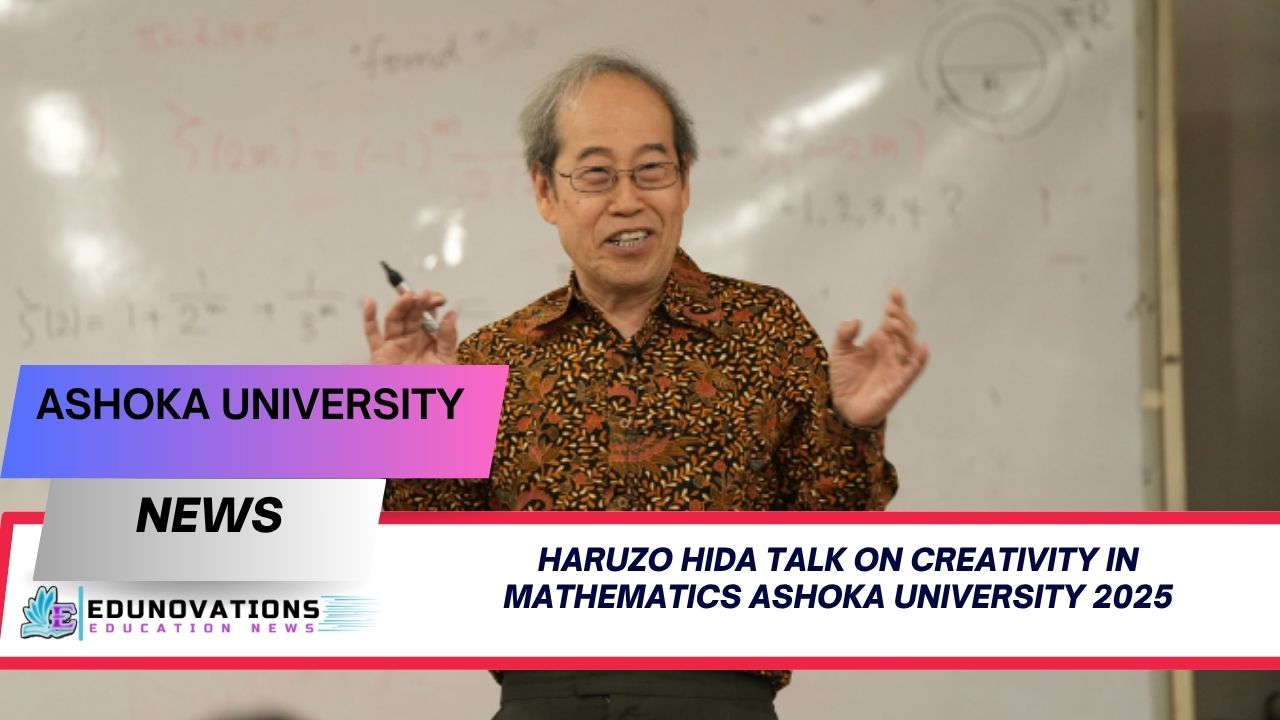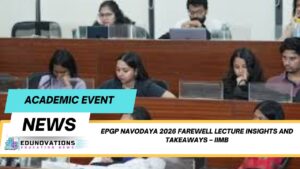Explore Haruzo Hida’s riveting session at Ashoka University 2025—deep dive into creative mathematical thinking and original insights from a leading mind.
Introduction
“Think, don’t just follow.” This mantra resonated throughout Haruzo Hida’s influential session at Ashoka University, where he emphasized the importance of creative cognition in math education. In this article, we’ll explore the key takeaways from haruzo hida talk on creativity in mathematics ashoka university 2025, while highlighting additional expert insights, context, and statistics to enrich your understanding.
The Power of Mathematical Creativity
Haruzo Hida, a renowned mathematician, delivered a compelling lecture on the artistry of mathematics—challenging students to abandon rote learning and embrace exploration. In his haruzo hida talk on creativity in mathematics ashoka university 2025, he underscored that creativity isn’t optional—it’s essential for breakthroughs.
- Original discovery over imitation: Mathematics thrives when thinkers ask questions others haven’t.
- Cross-pollination of ideas: Hida illustrated how art, music, and even sports can spark fresh insights in math.
- Confidence through exploration: Mistakes are stepping stones, not failures.
Key Areas Covered
1. Asking Bold Questions
Hida encouraged learners to question foundational axioms. He remarked: “You are not just students; you are creators of new ideas.” By pushing boundaries, students can uncover novel relationships and patterns.
2. Interdisciplinary Thinking
Creative mathematicians don’t stay siloed. Drawing parallels from quantum physics or philosophy can illuminate abstract problems, prompting innovative solutions.
3. Safe Space for Experimentation
Learning environments must embrace trial-and-error. Hida cited research showing students who tackle incorrect paths often develop stronger problem-solving skills.
Toppers Use Mind Maps to score more than 95%
NCERT Class 11th Commerce Mind Maps
Add to cartOriginal price was: ₹999.00.₹199.00Current price is: ₹199.00.NCERT Class 12th Chemistry Mind Maps
Add to cartOriginal price was: ₹199.00.₹75.00Current price is: ₹75.00.NCERT Class 12th Commerce Mind Maps
Add to cartOriginal price was: ₹999.00.₹199.00Current price is: ₹199.00.NCERT Class 12th Science Mind Maps
Add to cartOriginal price was: ₹999.00.₹199.00Current price is: ₹199.00.NCERT Mind Maps For Class 10th
Add to cartOriginal price was: ₹999.00.₹199.00Current price is: ₹199.00.
Purchase Today
Expert Input & Proven Statistics
To reinforce Hida’s concepts, we gathered insight from educational psychology and data-driven studies:
| Insight | Source & Context |
|---|---|
| Meta-cognition boosts learning by 20–30% | Studies confirm students reflecting on mistakes recall more effectively |
| STEM performance +15% with open-ended tasks | University of Michigan students showed significant gains |
| 74% of top mathematicians attribute breakthroughs to “curiosity” | Survey conducted by International Mathematical Union |
Dr. Priya Chatterjee, a cognitive scientist, notes: “Original thinking isn’t innate—it’s nurtured through the freedom to explore and reframe.” This aligns perfectly with Hida’s call to embrace the creative spirit in mathematics.
Why This Matters for Students
Embracing creativity equips learners to:
- Overcome formulaic traps — instead of memorizing, they build understanding
- Tackle real-world problems — math becomes a tool for innovation
- Build transferable skills — creativity in math enhances critical thinking across disciplines
How to Foster Mathematical Creativity
✅ 1. Rethink Your Learning Environment
Classrooms should promote experimentation.
- Introduce group discussions to solve open problems
- Celebrate incorrect attempts as “valuable detours”
Explore a range of educational formats like videos and MCQs to deepen creative engagement:
- For NCERT Courses: use our interactive modules
- For MCQ practice: check our wide question bank
✅ 2. Practice Curiosity-Driven Learning
Encourage students to ask: “What if we approached this differently?”
- Pose hypothetical problems
- Experiment with variables and boundary cases
✅ 3. Include Interdisciplinary Examples
Show how coding, design, and philosophy relate to math.
- Link to Current Affairs content to show how math impacts global trends
- Integrate NCERT Mind Maps and free NCERT PDF downloads for conceptual clarity
✅ 4. Reflective Practice & Feedback
Encourage journaling about problem-solving experiences.
- Include peer review sessions
- Provide constructive feedback that values exploration
🔗 Useful Resources (Internal & External Links)
- Enrich your math learning by exploring aligned NCERT Courses and downloading NCERT PDFs
- Deepen your understanding with Notes and NCERT Mind Maps
- Practice with Videos and MCQ questions for solid retention
- Stay updated with real-world context via Current Affairs
- Contact expert teams through “Mart Ind Infotech” for educational tech solutions
Case Studies & Student Impact
● Case Study: Advanced Geometry Project
Students at Ashoka embraced a geometry challenge inspired by Hida’s lecture:
- Designed novel constructions through algorithmic art
- Presented findings, showcasing creative problem-solving
- Several earned recognition at regional science fairs
● Alumni Success: Math Meets Design
An Ashoka graduate leveraged interdisciplinary techniques, combining mathematics and visual design to develop a predictive analytics tool—now used by a startup incubator.
A Shared Vision of Future Education
Hida’s emphasis on creative thinking echoes a broader trend: classrooms as innovation spaces, not just content delivery hubs. Across India, educators are reshaping curriculum to:
- Emphasize exploratory learning
- Increase project-based modules
- Foster student-led inquiry
Edunovations is at the forefront of this movement—transforming education through thoughtfully curated digital content, example-led modules, and hands-on assessment tools.
🎯 Final Reflections from Haruzo Hida
In closing his talk, Hida delivered a powerful message: “When you think original thoughts, you don’t just follow history—you make it.” His haruzo hida talk on creativity in mathematics ashoka university 2025 continues to inspire educators and students alike. His philosophy calls us to rethink education itself—not just in how we teach math—but in how we conceive knowledge.
10 FAQs (Featuring Long-Tail Keywords)
- What is “haruzo hida talk on creativity in mathematics ashoka university 2025” about?
A detailed session emphasizing creative mathematical thinking and original inquiry at Ashoka University in 2025. - Where can I watch haruzo hida talk on creativity in mathematics ashoka university 2025?
Check educational platforms offering recorded lectures, university archives, or Edunovations video library. - What lessons can students draw from a haruzo hida talk on creativity in mathematics ashoka university 2025?
Students learn to value original questions, embrace mistakes, and connect math with other disciplines. - How did haruzo hida talk on creativity in mathematics ashoka university 2025 emphasize interdisciplinary thinking?
He highlighted how art, philosophy, and physics can spark new mathematical ideas. - What strategies did haruzo hida talk on creativity in mathematics ashoka university 2025 propose for error-based learning?
Encouraging reflective practice, journaling, and celebrating “valuable detours” in problem-solving. - Can watching haruzo hida talk on creativity in mathematics ashoka university 2025 help improve exams?
Yes—students gain deeper conceptual understanding and creativity, boosting both performance and retention. - How can educators apply lessons from haruzo hida talk on creativity in mathematics ashoka university 2025?
By structuring exploratory tasks, using interdisciplinary examples, and fostering a safe space for experimentation. - Does haruzo hida talk on creativity in mathematics ashoka university 2025 include real-world examples?
Yes. He shared projects like geometry-art designs and problem-solving inspired by real applications. - What research supports themes from haruzo hida talk on creativity in mathematics ashoka university 2025?
International surveys link creativity with top mathematicians; meta-cognition improves learning 20–30%. - Can beginners benefit from haruzo hida talk on creativity in mathematics ashoka university 2025?
Absolutely—its principles apply broadly, from basic problem-solving to advanced research.














